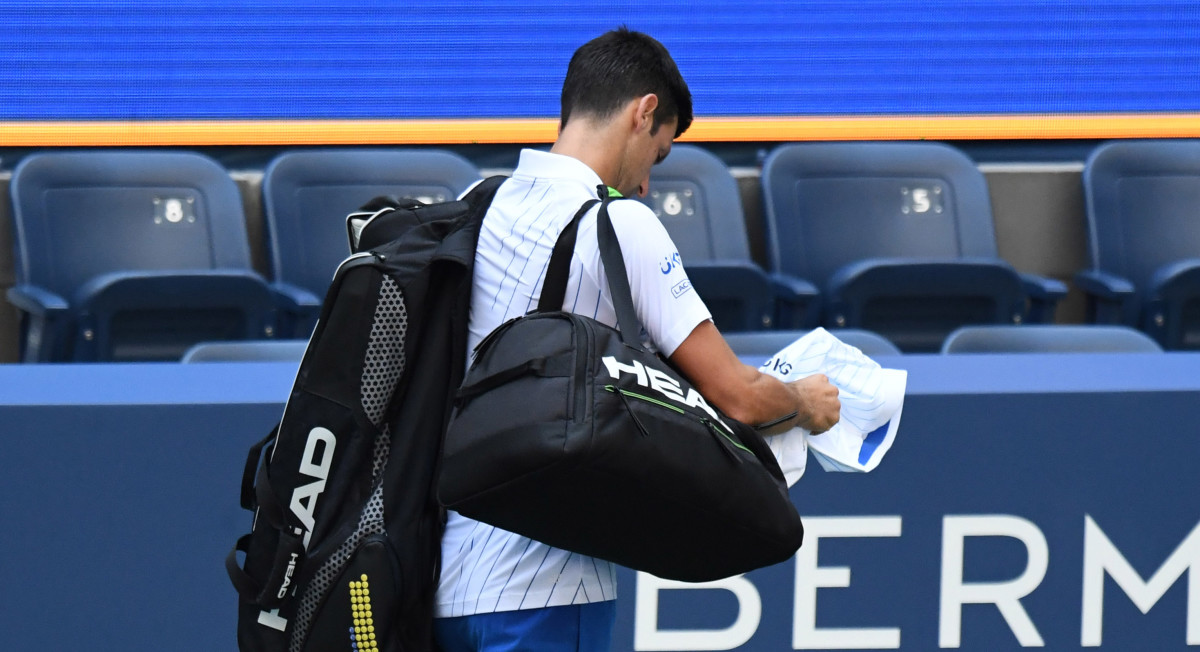Djokovic's Disastrous Default Derails His GOAT Chase—And May Stain His Legacy

Well, now we know the answer to the most discussed tennis question in 2020. Who can beat Novak Djokovic, who entered today’s fourth round U.S. Open match, 26-0 on the year?
The answer: Novak Djokovic.
An absolutely stunning unforced error, Djokovic was defaulted this afternoon late in the first set of his match against Spain's Pablo Carreño Busta. While Djokovic’s anger was self-directed, he fired off ball that struck a lineswoman in the throat. In accordance with the Grand Slam rulebook, this “negligent disregard” triggers an automatic default. In legal terms, this is a strict liability crime.
Djokovic left the grounds without speaking to the media, but this may mark a massive pivot point—not just of this unusual tournament but of tennis history. With 17 career major singles titles, Djokovic trails Rafael Nadal (19) and Roger Federer (20), the lead criteria in tennis’ GOAT debate. As the only member of the Big Three to attend this event — he took the court today as the only male player in the draw to have ever won a major — he was the odds-on favorite to win in New York and narrow the gap.
Not only will that not happen, but one wonders about the long-term impact of this gaffe. In an extraordinarily harshly worded statement, the USTA noted that Djokovic will lose all of his ranking points and prize money from this tournament, and will likely be fined additionally. How Djokovic will handle the splashback from this catastrophe will be a prominent theme going forward.

As for the tournament itself, it, too, was jolted. For the first time in four years, a player outside the Big Three will walk away with the title. Austria’s Dominic Thiem is the highest remaining seed and Russia’s Daniil Medvedev, who reached the final last year, is still in the draw as well. And let’s devote a few lines to Carreño Busta, the opponent today. While Djokovic authored his own demise, the Spaniard’s play was a contributing factor, causing, as it did, such frustration and agitation. Rightly stunned, as so many others were, Carreño Busta said afterwards, “I never expected this moment.”
Neither did the tournament. Part of what makes this incident still more remarkable: the context. This “closed open,” the first tennis major staged post-COVID, featured no fans and a bubble-type of atmosphere. Officials planned for hundreds of scenarios and eventualities and controversies. The top seed defaulted mid-match for hitting a line judge with a ball was not among them.
The popular discussion topic before this tournament: would the title come adorned with an asterisk, given the absence of fans and a moth-eaten field. The view here was that it would possibly be quite the opposite: the players who won the event would not have a diluted title, but one freighted with extra meaning, able, as they were to compartmentalize the chaos and persevere. It is beyond shocking that the world’s number one player in the world wasn’t up to that. And took himself out of contention.
